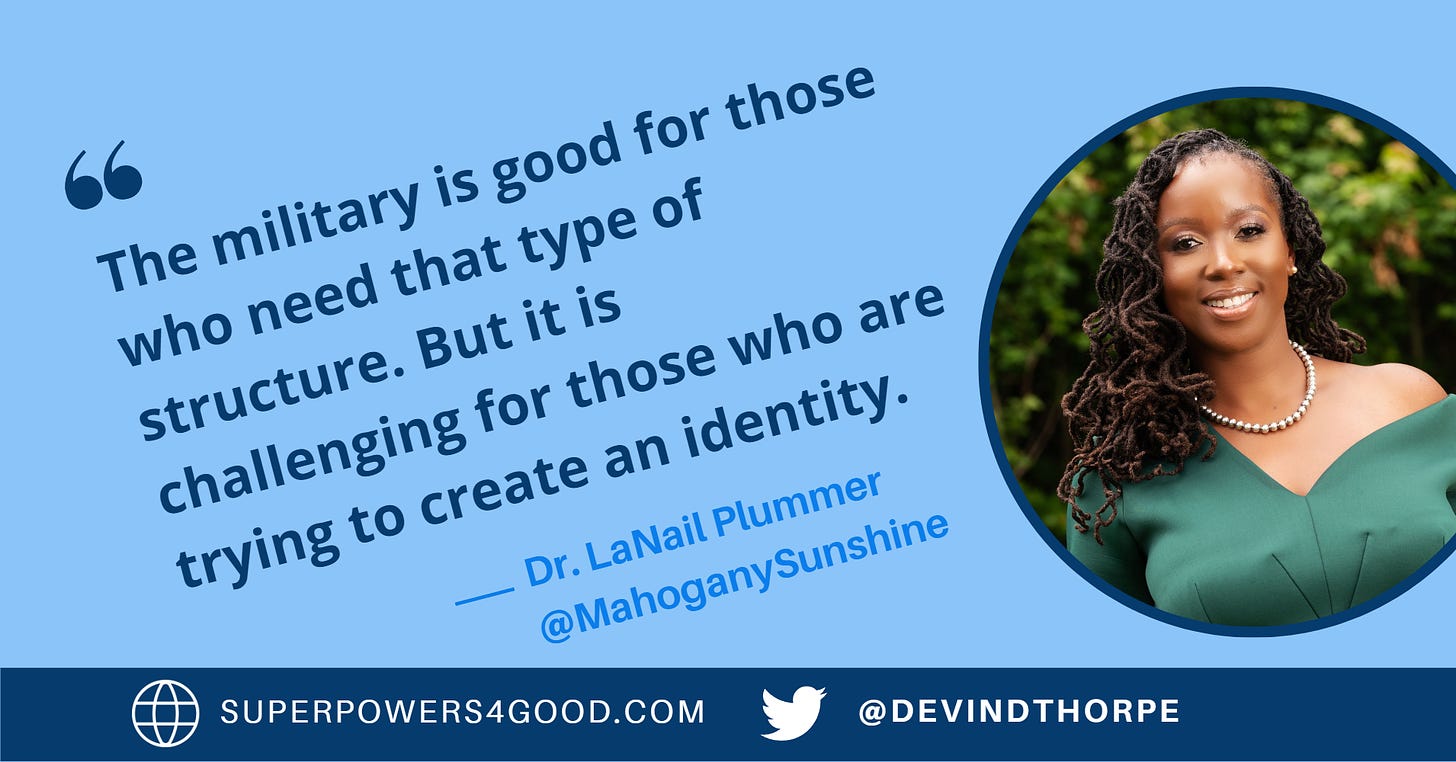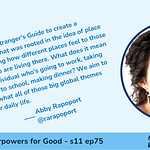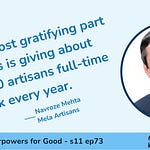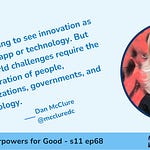If you’re in emotional distress or suicidal crisis, find help in your area with Find a helpline.
Devin: What is your superpower?
LaNail: I like to think that I’m just magic. I’m just walking magic. I just sprinkle magic everywhere I go. That magic comes in the form of what people would see as disciplined or intentional, the intersection of understanding words and the power of words, as well as being spiritually intuitive.
Ten years ago, there were few conversations about mental health at intersections people regularly encounter. Dr. LaNail Plummer recognized the lack of focus on individuals who are members of multiple communities—Black, LGBTQ, military and veterans—and launched a practice called Onyx Therapy Group to serve them.
Her lived experience at multiple intersections frames her work. “Not only am I a veteran, I’m a black woman who identifies as bisexual and a single mother for several years and a person coming from poverty who is now not identifying as a person in poverty,” she says.
Serving Youth
One of her focus areas is children approaching middle school and struggling with their identity.
“If I can help young children with their mental health, then it has a parallel process where I’m able to help their parents, and I’m able to help anybody in their social ecosystem,” LaNail says.
“I’m also able to intervene with that young child before they go to middle school or high school, and they get cemented into some of the maladaptive behaviors or the negative cognitive distortions that will cause issues for them later on in life,” she says.
“Someone can start identifying as part of the LGBTQ community without ever having any type of behavioral interaction with somebody that’s in their same gender base, meaning in classic terms, that they’re still, quote-unquote a virgin, but they still are identifying as part of the LGBTQ community,” she says.
“The intersections of that human development, in addition to that general identity development about sexual orientation, is a fragile place,” she says, punctuating her motivation for helping young people.
Stereotypes in the media complicate children’s experience discovering themselves.
“They’re causing a young person who doesn’t have all the skills, who doesn’t have all the resources, and who certainly doesn’t have the full capacity of their brain development to start making some impulsive and risky decisions,” LaNail says. “That can lead to self-injurious—not suicidal behaviors—that can lead to just general risky behaviors like speeding and all those kind of things.”
Children who reach the point of attempting suicide don’t want to die, research among survivors shows. “They just want that pain to stop,” LaNail says. “They want the isolation and the feeling of abandonment to stop. And they don’t know how it’s going to stop. Subsequently, they don’t know how long they can endure. So most times they’re not really wanting to die; they just want the pain to end.”
LaNail sees talk therapy as a key to helping children—and adults. She explains:
The research varies on how many thoughts we have in a minute, but on average they're thinking we have about 100 thoughts a minute, right? So we have our conscious thoughts, we have our subconscious thoughts, we have our unconscious thoughts. We're not quite sure which of those thoughts we're making behaviors off of. But all of these things are just happening. And we start to ruminate, right? And so one of the things that is most helpful is stopping the rumination by just allowing people to say what they haven't said before, just talking, just getting it out.
She employs talk therapy not only with children but also with veterans and active members of the armed forces.
Serving Veterans and Active Members of the Military
Serving in the armed forces can be difficult for many reasons. “The military is good for those who need that type of structure,” LaNail says. “But it is challenging for those who are trying to create an identity.”
“We are weapons in the time of war,” she says. “So, they don’t need us to have a whole lot of individual identity because that takes away from the purpose of being in the military.”
Military service can be particularly tough for people who think they have limited options. “When people choose the military as a career option because they believe that’s their only career option, it becomes even more limiting because they don’t have the opportunity to get out,” LaNail says. “They feel the pressure to stay in and subsequently suppress their identity.”
To serve members of the armed forces, she draws on her personal experience. “I remember being in the military and knowing that I was attracted to women as much as I was attracted to men and the shame that I had.”
In all her work, LaNail leverages her “magical” superpower.
How to Develop Your Own Magic As a Superpower
LaNail works to share her magic—empathy, intuition and healing—even in small doses. “I’m very intentional about how I show up because it’s important to me to sprinkle magic wherever I am. A little bit of magic here and a little bit of magic there,” she says. “I think about my superpower and being able to heal people in small increments.”
A simple touch is one way she shares her magic. “If you have been disconnected from humans and you’ve had trauma, and you have trust issues, and you have identity issues, and you want to be seen, and you want to be heard, sometimes you just need somebody to touch you and say, I see you. I hear you,” LaNail says. “Sometimes you just need a touch. And that’s what I do.”
Deeply spiritual, LaNail invokes help from the divine—not just her own. “I oftentimes pray not just to my God and my spiritual guides but—whomever I’m interacting with—I pray to their guides, too,” she says. “I ask them to use me as a vessel. Tell me what I need to say. Tell me what I need to do in this moment so that this person that’s in front of me hears the message that you want them to hear.”
To demonstrate the impact of her superpower, LaNail shared this anecdote:
I’m open and talking to my students about my sexual orientation. I’m open to talking about the fact that I came out when I was in my thirties. So, not even a decade ago. I’m open and talking about being a single mother for so long and what that meant for me and my career and my mental health.
Yesterday, one of my students came after my presentation and quite, quite emotionally said, “Hey, Dr. Plummer, this is my very first time having a professor who was queer.” And what I was thinking was, “It’s the first time you knew that they were queer.” But what he was also saying was, “I now feel like I have a professional place. I didn’t know if I could be a professional and be queer. I didn’t know if the two could exist together. Just you being you made me know that I’m going to be okay.”
To develop your own magic, LaNail suggests believing a central tenet: “I truly 100 percent believe without a doubt that we all came to this earth for a particular purpose, and we are packaged intentionally to fulfill that purpose. So whether somebody is really tall or whether they’re really short or whether they are bigger-bodied or smaller-bodied or whether they are queer or not, all of that is part of the purpose.”
With that frame in place, she offers this pro tip: “The first thing you need to do is connect with yourself every day.”
“When you first get up, and you want to get on social media, are you going to go and do that? You need to do something that is just you,” LaNail says. “Take a deep breath, reconciling whatever is happening in you. Listening. For just the moment. Not a minute. A minute is shorter than a moment. Listening for a moment. And understanding what your direction is for that particular day.”
As a therapist, a CEO, a professor, a public speaker and a mother, LaNail’s life is busy. She’s able to do it all by taking her own advice.
“I center myself because I need to hear what I’m supposed to be working on and doing that day from myself and from Spirit. Otherwise, I’m going to be flailing, and I’m going to do all this and all that and all this, and nothing’s going to get accomplished.”
By following LaNail’s example and counsel, you can develop your magic as a superpower that enables you to do more good in the world.

























This Therapist Focuses on Serving People at Life's Vulnerable Intersections